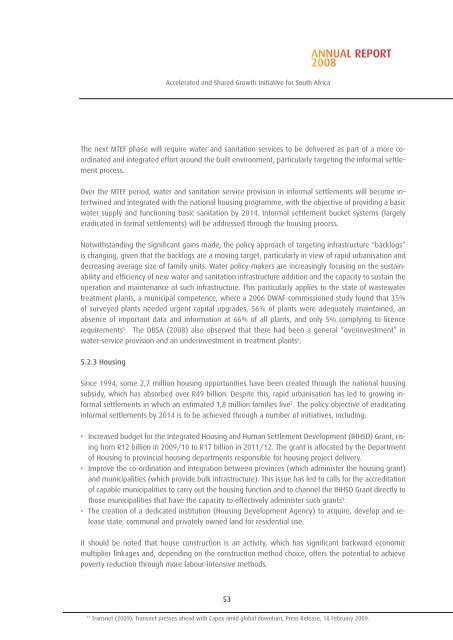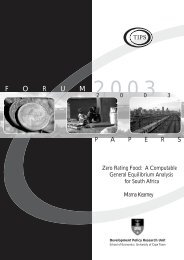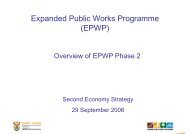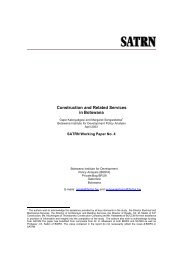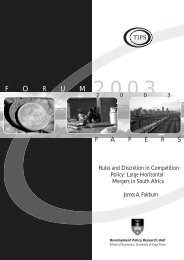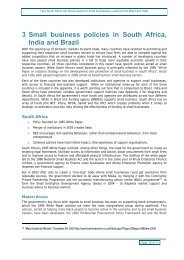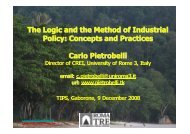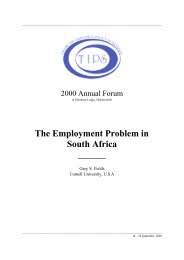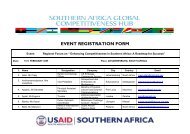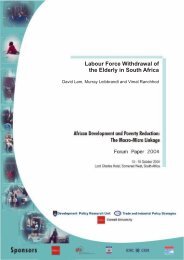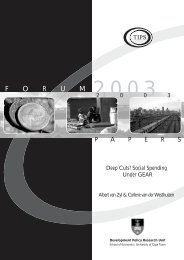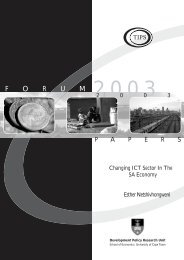(AsgiSA) Annual Report 2008 - South African Government Information
(AsgiSA) Annual Report 2008 - South African Government Information
(AsgiSA) Annual Report 2008 - South African Government Information
You also want an ePaper? Increase the reach of your titles
YUMPU automatically turns print PDFs into web optimized ePapers that Google loves.
Accelerated and Shared Growth Initiative for <strong>South</strong> Africa<br />
ANNUAL REPORT<br />
<strong>2008</strong><br />
The next MTEF phase will require water and sanitation services to be delivered as part of a more coordinated<br />
and integrated effort around the built environment, particularly targeting the informal settlement<br />
process.<br />
Over the MTEF period, water and sanitation service provision in informal settlements will become intertwined<br />
and integrated with the national housing programme, with the objective of providing a basic<br />
water supply and functioning basic sanitation by 2014. Informal settlement bucket systems (largely<br />
eradicated in formal settlements) will be addressed through the housing process.<br />
Notwithstanding the significant gains made, the policy approach of targeting infrastructure “backlogs”<br />
is changing, given that the backlogs are a moving target, particularly in view of rapid urbanisation and<br />
decreasing average size of family units. Water policy-makers are increasingly focusing on the sustainability<br />
and efficiency of new water and sanitation infrastructure addition and the capacity to sustain the<br />
operation and maintenance of such infrastructure. This particularly applies to the state of wastewater<br />
treatment plants, a municipal competence, where a 2006 DWAF-commissioned study found that 35%<br />
of surveyed plants needed urgent capital upgrades, 56% of plants were adequately maintained, an<br />
absence of important data and information at 66% of all plants, and only 5% complying to licence<br />
requirements 5 . The DBSA (<strong>2008</strong>) also observed that there had been a general “overinvestment” in<br />
water-service provision and an underinvestment in treatment plants 6 .<br />
5.2.3 Housing<br />
Since 1994, some 2,7 million housing opportunities have been created through the national housing<br />
subsidy, which has absorbed over R49 billion. Despite this, rapid urbanisation has led to growing informal<br />
settlements in which an estimated 1,8 million families live 7 . The policy objective of eradicating<br />
informal settlements by 2014 is to be achieved through a number of initiatives, including:<br />
• Increased budget for the Integrated Housing and Human Settlement Development (IHHSD) Grant, rising<br />
from R12 billion in 2009/10 to R17 billion in 2011/12. The grant is allocated by the Department<br />
of Housing to provincial housing departments responsible for housing project delivery.<br />
• Improve the co-ordination and integration between provinces (which administer the housing grant)<br />
and municipalities (which provide bulk infrastructure). This issue has led to calls for the accreditation<br />
of capable municipalities to carry out the housing function and to channel the IHHSD Grant directly to<br />
those municipalities that have the capacity to effectively administer such grants 8 .<br />
• The creation of a dedicated institution (Housing Development Agency) to acquire, develop and release<br />
state, communal and privately owned land for residential use.<br />
It should be noted that house construction is an activity, which has significant backward economic<br />
multiplier linkages and, depending on the construction method choice, offers the potential to achieve<br />
poverty reduction through more labour-intensive methods.<br />
53<br />
11<br />
Transnet (2009), Transnet presses ahead with Capex amid global downturn, Press Release, 18 February 2009.


